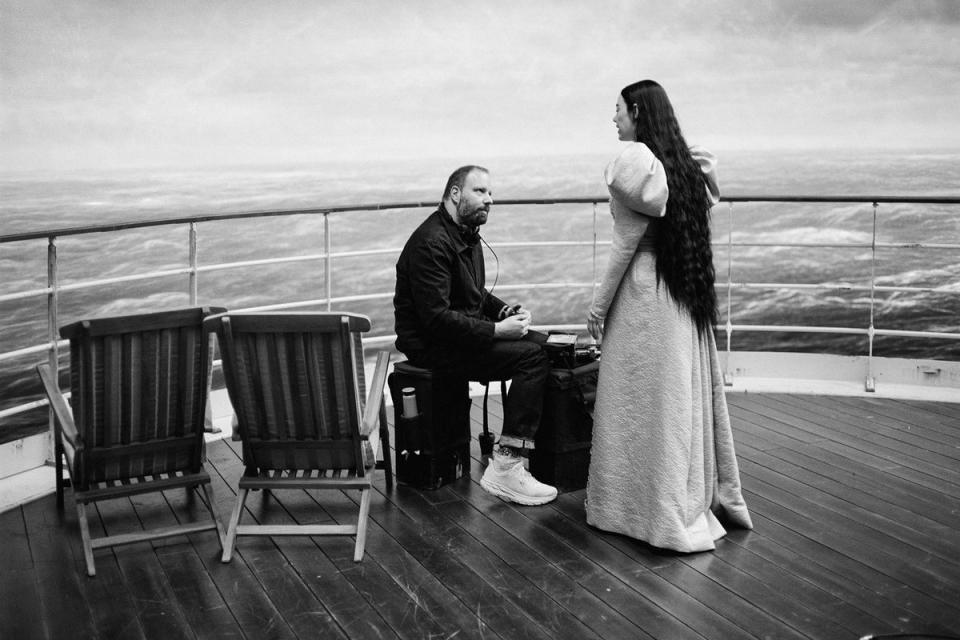Why Poor Things, Yorgos Lanthimos’s bizarre feminist masterpiece, should win the Oscar for Best Picture

For giant sleeves alone, Poor Things deserves to win an Oscar this weekend. In lieu of a Best Sleeves category, I will settle instead for it winning Best Picture.
I’m not even being facetious. Those sleeves, part of the most decadent costume designs from Holly Waddington – and swaddled around leading actor Emma Stone to devastating effect – shifted the trajectory of my entire wardrobe within the 141-minute runtime of this Frankenstein-esque fable. They cast a spell that has yet to lift; every week or so, I go back onto Vinted, type “big sleeves” into the search bar and buy four or more items in tulle and lace and ruffles.
Perhaps it seems insulting to reduce such a bombastic, complex and visually opulent rollercoaster ride of a film to sleeves. But they’re as good a prism as any through which to view the magic of director Yorgos Lanthimos’s adaptation of this 1992 novel by Alasdair Gray. They combine power and big “taking-up-space” energy with an unapologetic femininity – a fine metaphor for Stone’s Bella Baxter herself.
Those sleeves also change along the way, Bella’s outfits reflecting her evolution: from child in a woman’s body, to perpetually horny adolescent entirely consumed by “furious jumping” (her excellent term for sex); from burgeoning intellectual with an insatiable hunger for ideology, to weeping empath whose innocence is crushed by the cynical cruelty of the world; from inquisitive sex worker to doctor and wife of Ramy Youssef’s Max McCandles in a loving marriage of equals. It ain’t easy to convey all that with sleeves – but trust me, Poor Things pulls it off.
Sleeves aside, the film is, in true Lanthimos style – he of The Lobster and The Favourite fame – made up of such extraordinary originality that you’d be hard-pressed to compare it to anything else. The visuals begin in black and white, with Bella first brought up in the home of Willem Dafoe’s exquisitely eccentric mad-scientist character, nicknamed “God”. They then burst into Oz-like technicolour when she finally breaks free and ventures out into the world. Here, surrealist sets mean the characters look as if they’ve wandered into a Dalí painting – or as if Gaudi had been put in charge of designing entire cities. The vivid richness of colour, all pastel yellows and blues and pinks in Lisbon, creates a feast for the senses that precisely mirrors the intensity of Bella’s appetite for life. In fact, take a still from anywhere in this film, and you’re looking at a work of art.

Then there are the performances themselves. Stone won Best Actress at both this year’s Golden Globes and Baftas, and for good reason. She completely inhabits the world Lanthimos has created for her, and masterfully pulls off the development of Bella – a girl becoming a woman, an innocent transitioning into an adult of experience – without ever losing her beguiling balance of deadpan charm and unquenchable curiosity. The rest of the roles feel perfectly cast too, including Christopher Abbott’s chilling turn as Bella’s “husband” and Kathryn Hunter’s tart-with-a-heart-with-a-biting-fetish Swiney. You get the sense that everyone is having a tremendous amount of fun, even in the film’s darker moments.
And it is fun. Lanthimos’s films are often so outlandish in concept and style that people forget how funny they can be. It might not be billed as a comedy, but Poor Things made me laugh harder than any film I’ve seen at the cinema in about five years. “I must go punch that baby,” a line delivered by a straight-faced Stone, is pure comedic genius; 10 out of 10, no notes.
There’s been much debate over whether or not Poor Things is a feminist fairytale. Just as in the wake of Barbie, an unhelpful number of “hot takes” have been published on the subject. We can argue over the feminism of sex work till the cows come home, but intellectualising often stops us from acknowledging that how something makes us feel is just as relevant. The way in which Bella unashamedly moves through the world – pursuing sex, hedonism, knowledge, altruism, liberty, justice – well, it’s a heady thing to watch as a woman. She intrigues, seduces and terrifies men in equal measure, because she is that most rare of things: fearless. Bella can’t be boxed into one role, just as women never can be, despite society’s best efforts – she is by turns naive, sexy, strange, funny, aggressive, vulnerable, strong, whip-smart, compassionate, cold.
I walked out of the cinema feeling six feet taller just from having watched it. I went home and ordered all those sleeves, not because they were “fun” and “cute” but because somewhere inside me a light switch flipped on and I wanted to start physically taking up more space. I wanted to confidently claim back power. I wanted to ask for the things I want from life. With the best will in the world, I don’t think the same can be said for Oppenheimer.
‘Poor Things’ is streaming now on Disney+

 Yahoo News
Yahoo News 
